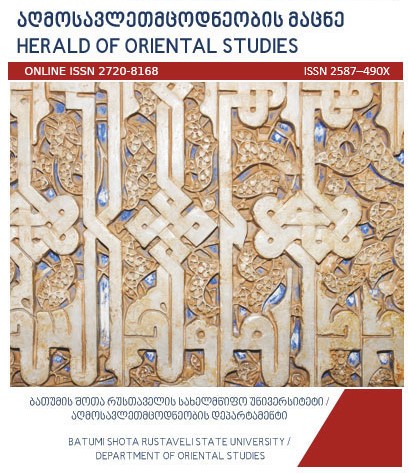სამხრეთ-დასავლეთ საქართველო (აჭარა) ოსმალეთის იმპერიის გეოსტრატეგიულ ინტერესებში XX საუკუნის პირველ მეოთხედში
South-Western Georgia (Ajara) within the Geostrategic Interests of the Ottoman Empire in the First Quarter of XXCentury
Author(s): Archil VarshalomidzeSubject(s): Politics, History, Diplomatic history, Political history, Recent History (1900 till today), Pre-WW I & WW I (1900 -1919), Interwar Period (1920 - 1939), The Ottoman Empire, Geopolitics
Published by: ბათუმის შოთა რუსთაველის სახელმწიფო უნივერსიტეტი, ჰუმანიტარული მეცნიერებატა ფაკულტეტის აღმოსავლეთმცოდნეობის დეპარტამენტის „ელექტრონული ჟურნალი“.
Keywords: South-Western Georgia (Ajara);
Summary/Abstract: The processes occurring in the world politics of the first half of the 20th century, which were the result of the First World War serious consequences, were reflected in Transcaucasia, including Georgia. Even in the course of peace conference new tendencies were outlined in Batumi. The imperialistic policy of Turkey became unacceptable for Germany. Such changes in foreign policy of Germany had been caused by the fact that Georgia carried out the function of the bridge between Europe and Asia.on June 4, 1918 an agreement on peace and cooperation was signed between the governments of the Democratic Republic of Georgia and the Ottoman Empire in Batumi In it the Georgian-Turkish border was determined in accordance with the state borders existing before the Russo-Turkish war in 1828-1929. The Turkish government took the advantage over the hard political situation in Europe caused by World War I and having violated the international Law and the Brest-Lithuanian Treaty taxed Georgia with hard conditions. As a result 9500 sg.m. of the area with 350 000 population was cut off the entire territory.With the assistance of the German government Georgia achieved its way in the results of the Batumi conference to be reconsidered. However, the conference was finally never held. The reason was the defeat of Germany and its alliance. The Turkish government well knew that on the coming place conference its territorial claims would appear inconsistent and it would have to cede most of its occupied territories.Consequently it applied to certain diplomatic methods. Namely, in order to make the union of Batumi-Karsy-Artaani regions a legal document, the Turkish government decided to hold a referendum in these regions.The referendum was held but with significant violations. According to the data of the Turkish side 83 thousand people voted in their favor but only 2 thousand-against them. On the other hand, according to the data of the Bolshevik press of that periods, 11 thousand people participated in the referendum, out of which 8500 voted in favor of the Turkish government.Today it is difficult to trust either of these data but one is clear – neither of them expressed the will of the population or the real situation.
Journal: საერთაშორისო სამეცნიერო ჟურნალი „აღმოსავლეთმცოდნეობის მაცნე“
- Issue Year: 1/2018
- Issue No: 1
- Page Range: 28-41
- Page Count: 14
- Language: Georgian

